World Religions GHUM 1143: Christianity and Islam Exam Prep
VerifiedAdded on 2023/06/08
|9
|1881
|231
Quiz and Exam
AI Summary
This document contains a quiz covering key concepts in Christianity and Islam. The Christianity section includes questions on the synoptic gospels, St. Augustine's arguments against Pelagius, the intellectual issues of the Middle Ages (Scholasticism vs. mysticism), Gnosticism, predestination in Calvinism, Glossolalia in Pentecostalism, the doctrine of the Trinity, the definition of a creed, the significance of Vatican II, the life of Francis of Assisi, the role of Constantine, the Council of Nicaea, Ulrich Zwingli's views on the Eucharist, the Eastern Orthodox Church, veneration of icons, Unitarianism's rejection of the Trinity, the anchorite movement with Anthony of Egypt, the founding of the World Council of Churches, Martin Luther King Jr.'s Liberation Theology, and the Social Gospel movement. The Islam section covers the Five Pillars of Islam, the hijrah, the term 'dhimmis,' Sufism, the Qur'an, the philosophy of Muhammad Iqbal, the commemoration of Ashura by Shi'as, fasting during Ramadan, the American Muslim Mission, the concept of Shirk, the meaning of 'Islam,' prophets acknowledged in the Qur'an, the importance of Hadith, different numbers of Imams followed by Shi’ites, and the Shahadah. Desklib provides students with access to this quiz and many other study tools.
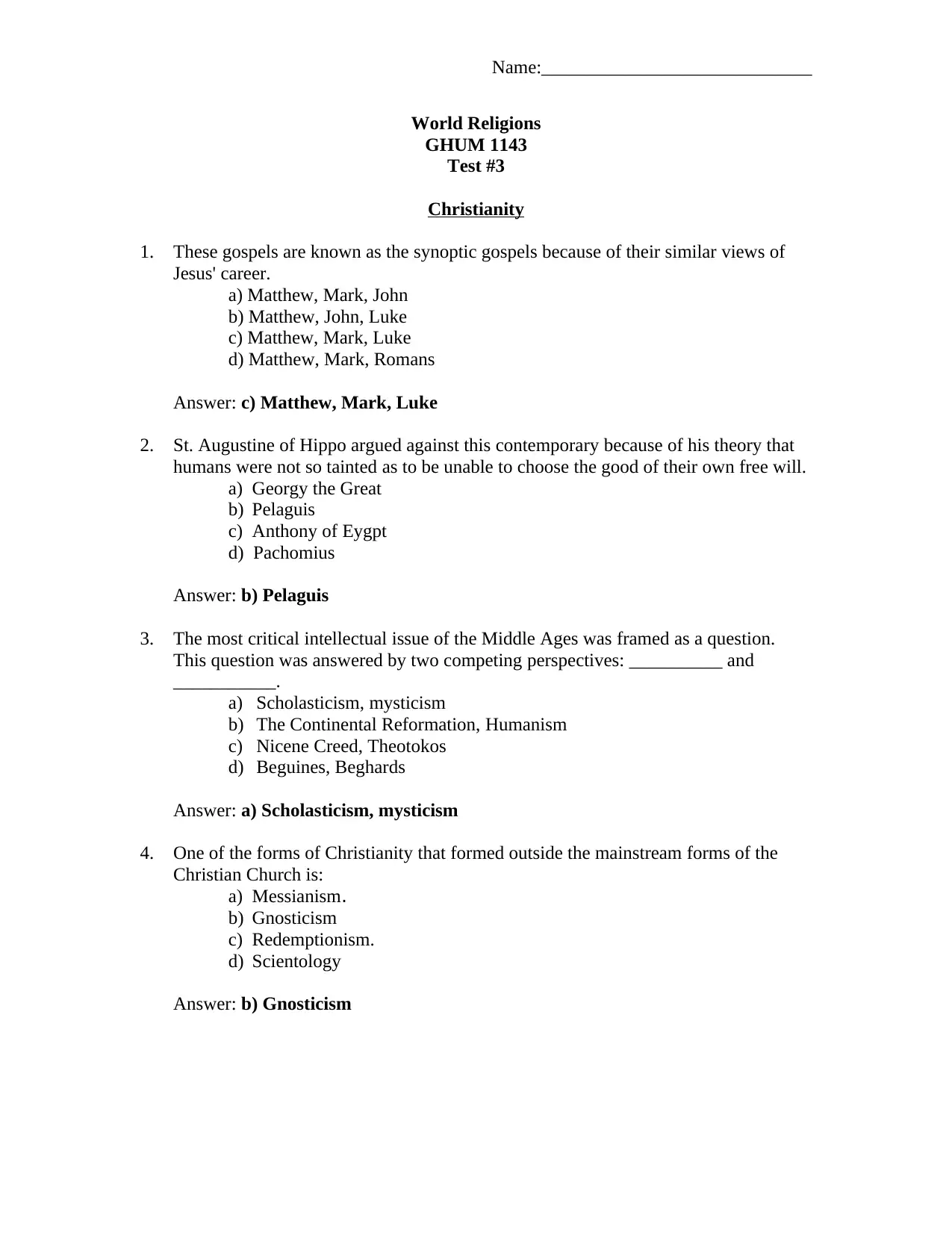
Name:_____________________________
World Religions
GHUM 1143
Test #3
Christianity
1. These gospels are known as the synoptic gospels because of their similar views of
Jesus' career.
a) Matthew, Mark, John
b) Matthew, John, Luke
c) Matthew, Mark, Luke
d) Matthew, Mark, Romans
Answer: c) Matthew, Mark, Luke
2. St. Augustine of Hippo argued against this contemporary because of his theory that
humans were not so tainted as to be unable to choose the good of their own free will.
a) Georgy the Great
b) Pelaguis
c) Anthony of Eygpt
d) Pachomius
Answer: b) Pelaguis
3. The most critical intellectual issue of the Middle Ages was framed as a question.
This question was answered by two competing perspectives: __________ and
___________.
a) Scholasticism, mysticism
b) The Continental Reformation, Humanism
c) Nicene Creed, Theotokos
d) Beguines, Beghards
Answer: a) Scholasticism, mysticism
4. One of the forms of Christianity that formed outside the mainstream forms of the
Christian Church is:
a) Messianism.
b) Gnosticism
c) Redemptionism.
d) Scientology
Answer: b) Gnosticism
World Religions
GHUM 1143
Test #3
Christianity
1. These gospels are known as the synoptic gospels because of their similar views of
Jesus' career.
a) Matthew, Mark, John
b) Matthew, John, Luke
c) Matthew, Mark, Luke
d) Matthew, Mark, Romans
Answer: c) Matthew, Mark, Luke
2. St. Augustine of Hippo argued against this contemporary because of his theory that
humans were not so tainted as to be unable to choose the good of their own free will.
a) Georgy the Great
b) Pelaguis
c) Anthony of Eygpt
d) Pachomius
Answer: b) Pelaguis
3. The most critical intellectual issue of the Middle Ages was framed as a question.
This question was answered by two competing perspectives: __________ and
___________.
a) Scholasticism, mysticism
b) The Continental Reformation, Humanism
c) Nicene Creed, Theotokos
d) Beguines, Beghards
Answer: a) Scholasticism, mysticism
4. One of the forms of Christianity that formed outside the mainstream forms of the
Christian Church is:
a) Messianism.
b) Gnosticism
c) Redemptionism.
d) Scientology
Answer: b) Gnosticism
Paraphrase This Document
Need a fresh take? Get an instant paraphrase of this document with our AI Paraphraser
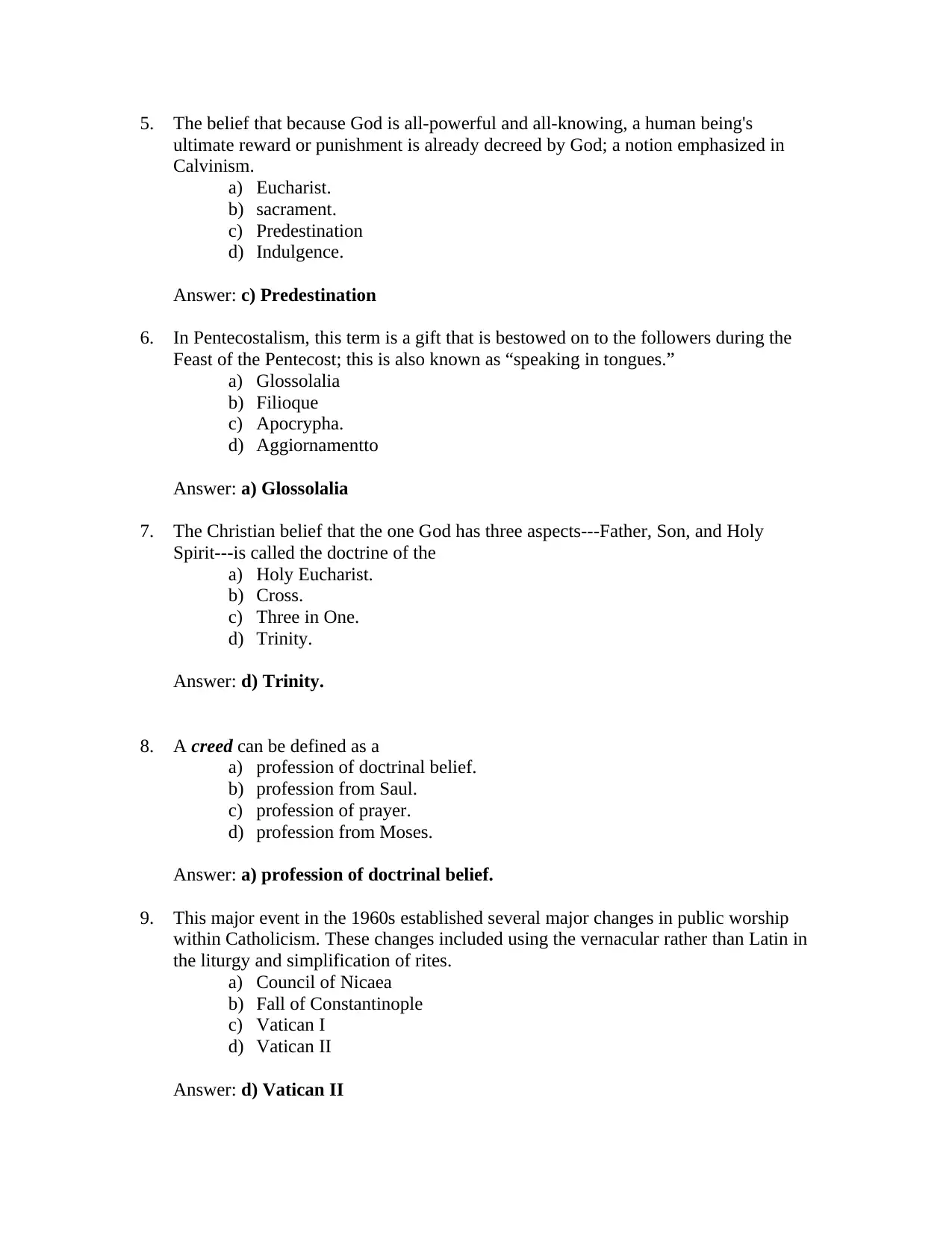
5. The belief that because God is all-powerful and all-knowing, a human being's
ultimate reward or punishment is already decreed by God; a notion emphasized in
Calvinism.
a) Eucharist.
b) sacrament.
c) Predestination
d) Indulgence.
Answer: c) Predestination
6. In Pentecostalism, this term is a gift that is bestowed on to the followers during the
Feast of the Pentecost; this is also known as “speaking in tongues.”
a) Glossolalia
b) Filioque
c) Apocrypha.
d) Aggiornamentto
Answer: a) Glossolalia
7. The Christian belief that the one God has three aspects---Father, Son, and Holy
Spirit---is called the doctrine of the
a) Holy Eucharist.
b) Cross.
c) Three in One.
d) Trinity.
Answer: d) Trinity.
8. A creed can be defined as a
a) profession of doctrinal belief.
b) profession from Saul.
c) profession of prayer.
d) profession from Moses.
Answer: a) profession of doctrinal belief.
9. This major event in the 1960s established several major changes in public worship
within Catholicism. These changes included using the vernacular rather than Latin in
the liturgy and simplification of rites.
a) Council of Nicaea
b) Fall of Constantinople
c) Vatican I
d) Vatican II
Answer: d) Vatican II
ultimate reward or punishment is already decreed by God; a notion emphasized in
Calvinism.
a) Eucharist.
b) sacrament.
c) Predestination
d) Indulgence.
Answer: c) Predestination
6. In Pentecostalism, this term is a gift that is bestowed on to the followers during the
Feast of the Pentecost; this is also known as “speaking in tongues.”
a) Glossolalia
b) Filioque
c) Apocrypha.
d) Aggiornamentto
Answer: a) Glossolalia
7. The Christian belief that the one God has three aspects---Father, Son, and Holy
Spirit---is called the doctrine of the
a) Holy Eucharist.
b) Cross.
c) Three in One.
d) Trinity.
Answer: d) Trinity.
8. A creed can be defined as a
a) profession of doctrinal belief.
b) profession from Saul.
c) profession of prayer.
d) profession from Moses.
Answer: a) profession of doctrinal belief.
9. This major event in the 1960s established several major changes in public worship
within Catholicism. These changes included using the vernacular rather than Latin in
the liturgy and simplification of rites.
a) Council of Nicaea
b) Fall of Constantinople
c) Vatican I
d) Vatican II
Answer: d) Vatican II
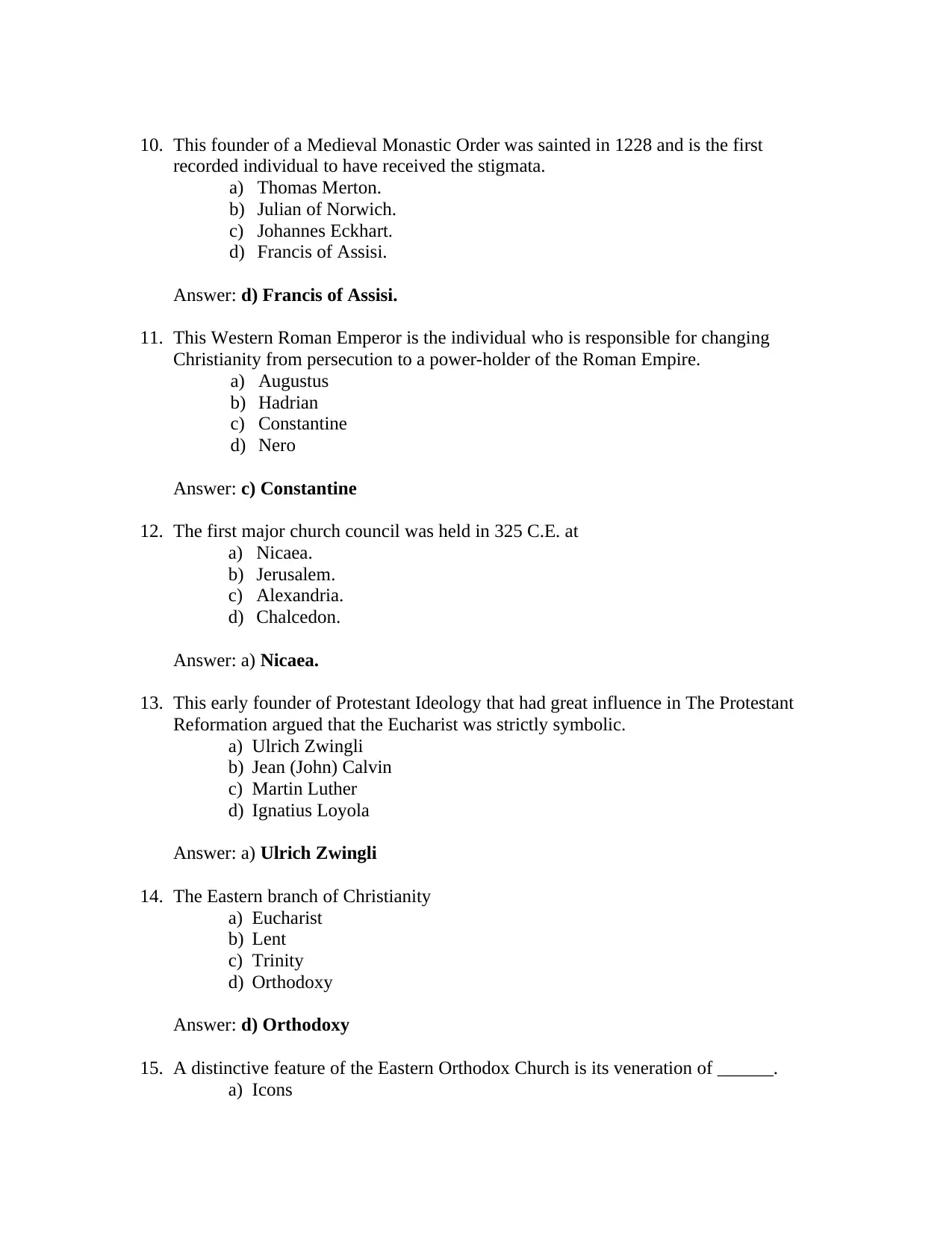
10. This founder of a Medieval Monastic Order was sainted in 1228 and is the first
recorded individual to have received the stigmata.
a) Thomas Merton.
b) Julian of Norwich.
c) Johannes Eckhart.
d) Francis of Assisi.
Answer: d) Francis of Assisi.
11. This Western Roman Emperor is the individual who is responsible for changing
Christianity from persecution to a power-holder of the Roman Empire.
a) Augustus
b) Hadrian
c) Constantine
d) Nero
Answer: c) Constantine
12. The first major church council was held in 325 C.E. at
a) Nicaea.
b) Jerusalem.
c) Alexandria.
d) Chalcedon.
Answer: a) Nicaea.
13. This early founder of Protestant Ideology that had great influence in The Protestant
Reformation argued that the Eucharist was strictly symbolic.
a) Ulrich Zwingli
b) Jean (John) Calvin
c) Martin Luther
d) Ignatius Loyola
Answer: a) Ulrich Zwingli
14. The Eastern branch of Christianity
a) Eucharist
b) Lent
c) Trinity
d) Orthodoxy
Answer: d) Orthodoxy
15. A distinctive feature of the Eastern Orthodox Church is its veneration of ______.
a) Icons
recorded individual to have received the stigmata.
a) Thomas Merton.
b) Julian of Norwich.
c) Johannes Eckhart.
d) Francis of Assisi.
Answer: d) Francis of Assisi.
11. This Western Roman Emperor is the individual who is responsible for changing
Christianity from persecution to a power-holder of the Roman Empire.
a) Augustus
b) Hadrian
c) Constantine
d) Nero
Answer: c) Constantine
12. The first major church council was held in 325 C.E. at
a) Nicaea.
b) Jerusalem.
c) Alexandria.
d) Chalcedon.
Answer: a) Nicaea.
13. This early founder of Protestant Ideology that had great influence in The Protestant
Reformation argued that the Eucharist was strictly symbolic.
a) Ulrich Zwingli
b) Jean (John) Calvin
c) Martin Luther
d) Ignatius Loyola
Answer: a) Ulrich Zwingli
14. The Eastern branch of Christianity
a) Eucharist
b) Lent
c) Trinity
d) Orthodoxy
Answer: d) Orthodoxy
15. A distinctive feature of the Eastern Orthodox Church is its veneration of ______.
a) Icons
⊘ This is a preview!⊘
Do you want full access?
Subscribe today to unlock all pages.

Trusted by 1+ million students worldwide
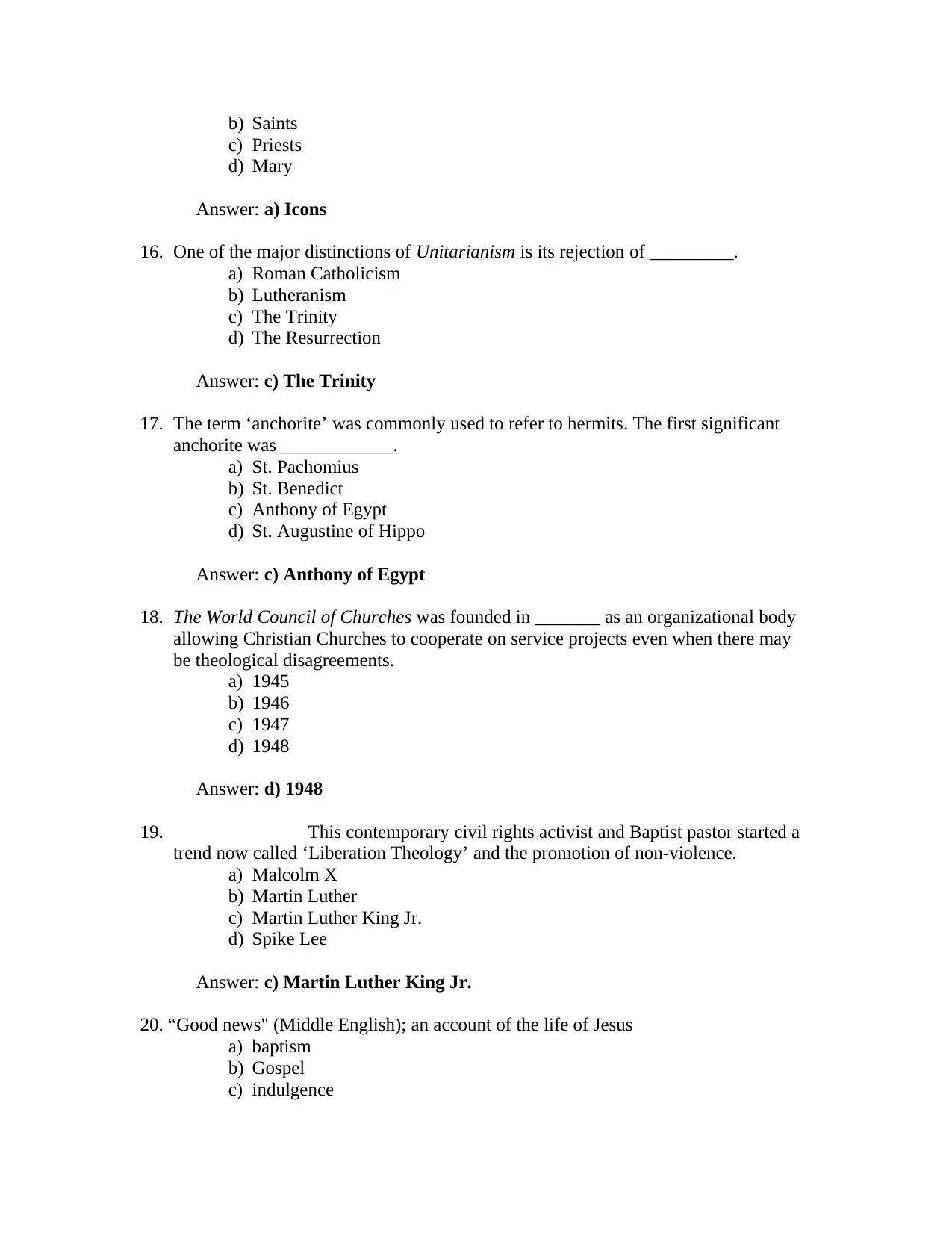
b) Saints
c) Priests
d) Mary
Answer: a) Icons
16. One of the major distinctions of Unitarianism is its rejection of _________.
a) Roman Catholicism
b) Lutheranism
c) The Trinity
d) The Resurrection
Answer: c) The Trinity
17. The term ‘anchorite’ was commonly used to refer to hermits. The first significant
anchorite was ____________.
a) St. Pachomius
b) St. Benedict
c) Anthony of Egypt
d) St. Augustine of Hippo
Answer: c) Anthony of Egypt
18. The World Council of Churches was founded in _______ as an organizational body
allowing Christian Churches to cooperate on service projects even when there may
be theological disagreements.
a) 1945
b) 1946
c) 1947
d) 1948
Answer: d) 1948
19. This contemporary civil rights activist and Baptist pastor started a
trend now called ‘Liberation Theology’ and the promotion of non-violence.
a) Malcolm X
b) Martin Luther
c) Martin Luther King Jr.
d) Spike Lee
Answer: c) Martin Luther King Jr.
20. “Good news" (Middle English); an account of the life of Jesus
a) baptism
b) Gospel
c) indulgence
c) Priests
d) Mary
Answer: a) Icons
16. One of the major distinctions of Unitarianism is its rejection of _________.
a) Roman Catholicism
b) Lutheranism
c) The Trinity
d) The Resurrection
Answer: c) The Trinity
17. The term ‘anchorite’ was commonly used to refer to hermits. The first significant
anchorite was ____________.
a) St. Pachomius
b) St. Benedict
c) Anthony of Egypt
d) St. Augustine of Hippo
Answer: c) Anthony of Egypt
18. The World Council of Churches was founded in _______ as an organizational body
allowing Christian Churches to cooperate on service projects even when there may
be theological disagreements.
a) 1945
b) 1946
c) 1947
d) 1948
Answer: d) 1948
19. This contemporary civil rights activist and Baptist pastor started a
trend now called ‘Liberation Theology’ and the promotion of non-violence.
a) Malcolm X
b) Martin Luther
c) Martin Luther King Jr.
d) Spike Lee
Answer: c) Martin Luther King Jr.
20. “Good news" (Middle English); an account of the life of Jesus
a) baptism
b) Gospel
c) indulgence
Paraphrase This Document
Need a fresh take? Get an instant paraphrase of this document with our AI Paraphraser
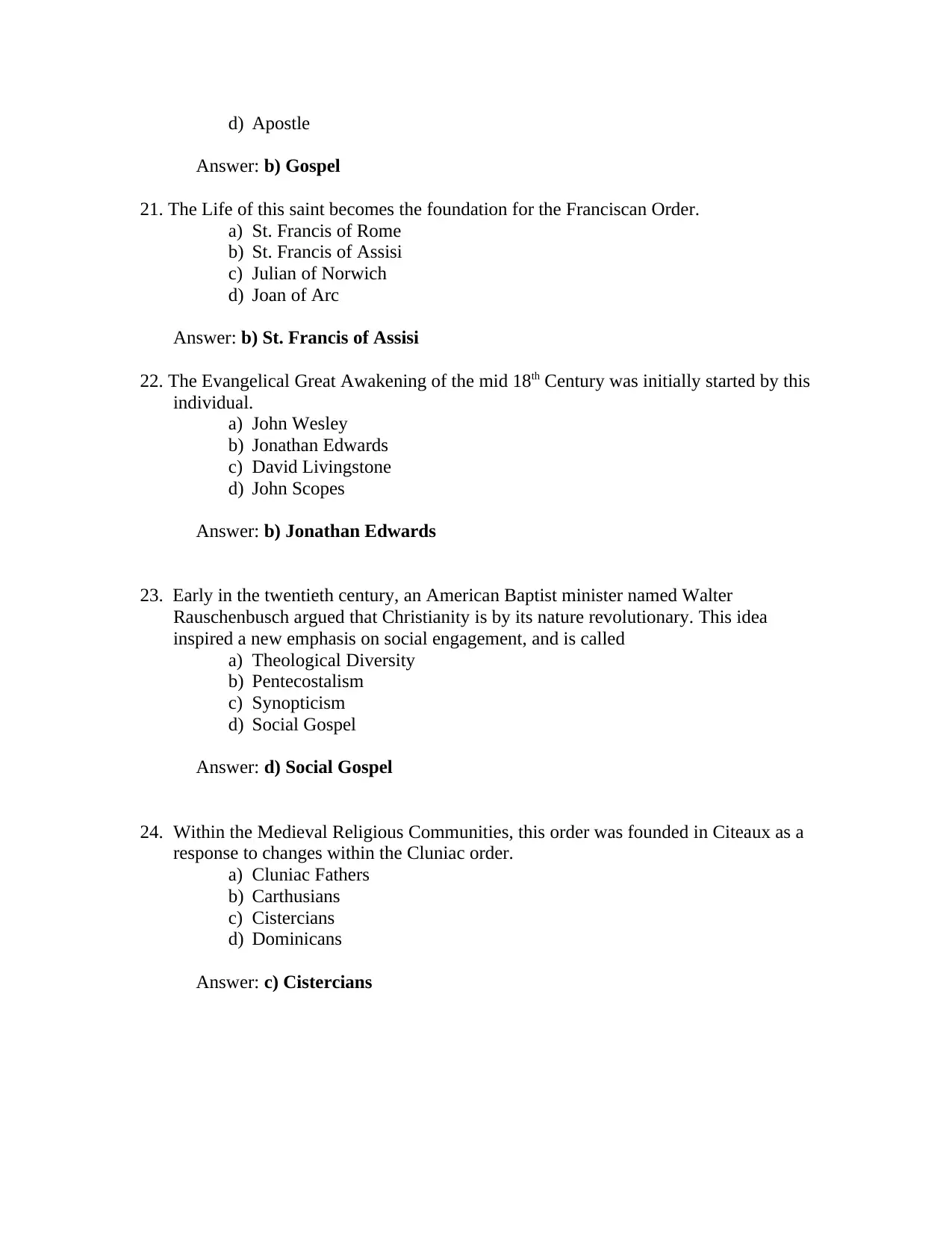
d) Apostle
Answer: b) Gospel
21. The Life of this saint becomes the foundation for the Franciscan Order.
a) St. Francis of Rome
b) St. Francis of Assisi
c) Julian of Norwich
d) Joan of Arc
Answer: b) St. Francis of Assisi
22. The Evangelical Great Awakening of the mid 18th Century was initially started by this
individual.
a) John Wesley
b) Jonathan Edwards
c) David Livingstone
d) John Scopes
Answer: b) Jonathan Edwards
23. Early in the twentieth century, an American Baptist minister named Walter
Rauschenbusch argued that Christianity is by its nature revolutionary. This idea
inspired a new emphasis on social engagement, and is called
a) Theological Diversity
b) Pentecostalism
c) Synopticism
d) Social Gospel
Answer: d) Social Gospel
24. Within the Medieval Religious Communities, this order was founded in Citeaux as a
response to changes within the Cluniac order.
a) Cluniac Fathers
b) Carthusians
c) Cistercians
d) Dominicans
Answer: c) Cistercians
Answer: b) Gospel
21. The Life of this saint becomes the foundation for the Franciscan Order.
a) St. Francis of Rome
b) St. Francis of Assisi
c) Julian of Norwich
d) Joan of Arc
Answer: b) St. Francis of Assisi
22. The Evangelical Great Awakening of the mid 18th Century was initially started by this
individual.
a) John Wesley
b) Jonathan Edwards
c) David Livingstone
d) John Scopes
Answer: b) Jonathan Edwards
23. Early in the twentieth century, an American Baptist minister named Walter
Rauschenbusch argued that Christianity is by its nature revolutionary. This idea
inspired a new emphasis on social engagement, and is called
a) Theological Diversity
b) Pentecostalism
c) Synopticism
d) Social Gospel
Answer: d) Social Gospel
24. Within the Medieval Religious Communities, this order was founded in Citeaux as a
response to changes within the Cluniac order.
a) Cluniac Fathers
b) Carthusians
c) Cistercians
d) Dominicans
Answer: c) Cistercians
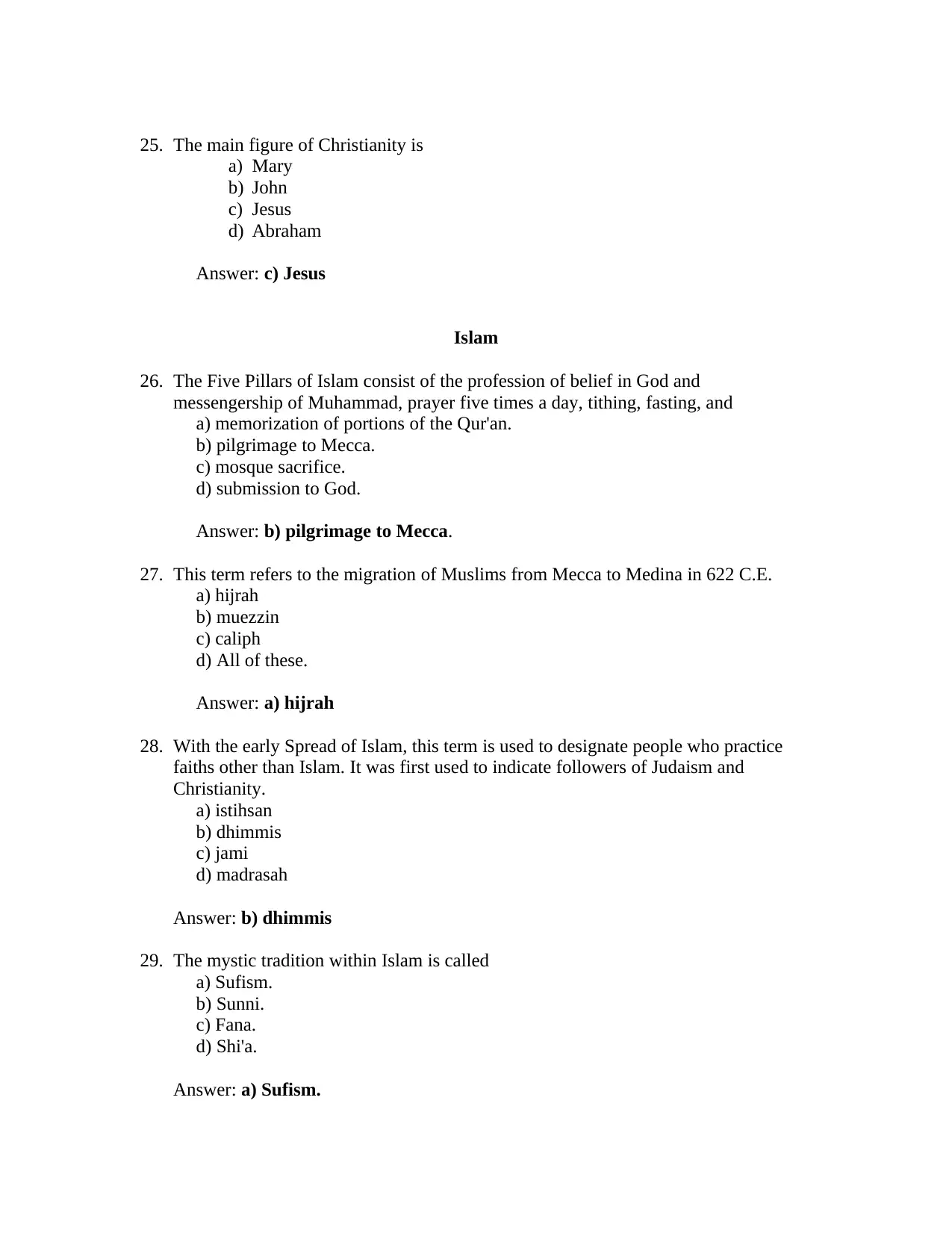
25. The main figure of Christianity is
a) Mary
b) John
c) Jesus
d) Abraham
Answer: c) Jesus
Islam
26. The Five Pillars of Islam consist of the profession of belief in God and
messengership of Muhammad, prayer five times a day, tithing, fasting, and
a) memorization of portions of the Qur'an.
b) pilgrimage to Mecca.
c) mosque sacrifice.
d) submission to God.
Answer: b) pilgrimage to Mecca.
27. This term refers to the migration of Muslims from Mecca to Medina in 622 C.E.
a) hijrah
b) muezzin
c) caliph
d) All of these.
Answer: a) hijrah
28. With the early Spread of Islam, this term is used to designate people who practice
faiths other than Islam. It was first used to indicate followers of Judaism and
Christianity.
a) istihsan
b) dhimmis
c) jami
d) madrasah
Answer: b) dhimmis
29. The mystic tradition within Islam is called
a) Sufism.
b) Sunni.
c) Fana.
d) Shi'a.
Answer: a) Sufism.
a) Mary
b) John
c) Jesus
d) Abraham
Answer: c) Jesus
Islam
26. The Five Pillars of Islam consist of the profession of belief in God and
messengership of Muhammad, prayer five times a day, tithing, fasting, and
a) memorization of portions of the Qur'an.
b) pilgrimage to Mecca.
c) mosque sacrifice.
d) submission to God.
Answer: b) pilgrimage to Mecca.
27. This term refers to the migration of Muslims from Mecca to Medina in 622 C.E.
a) hijrah
b) muezzin
c) caliph
d) All of these.
Answer: a) hijrah
28. With the early Spread of Islam, this term is used to designate people who practice
faiths other than Islam. It was first used to indicate followers of Judaism and
Christianity.
a) istihsan
b) dhimmis
c) jami
d) madrasah
Answer: b) dhimmis
29. The mystic tradition within Islam is called
a) Sufism.
b) Sunni.
c) Fana.
d) Shi'a.
Answer: a) Sufism.
⊘ This is a preview!⊘
Do you want full access?
Subscribe today to unlock all pages.

Trusted by 1+ million students worldwide
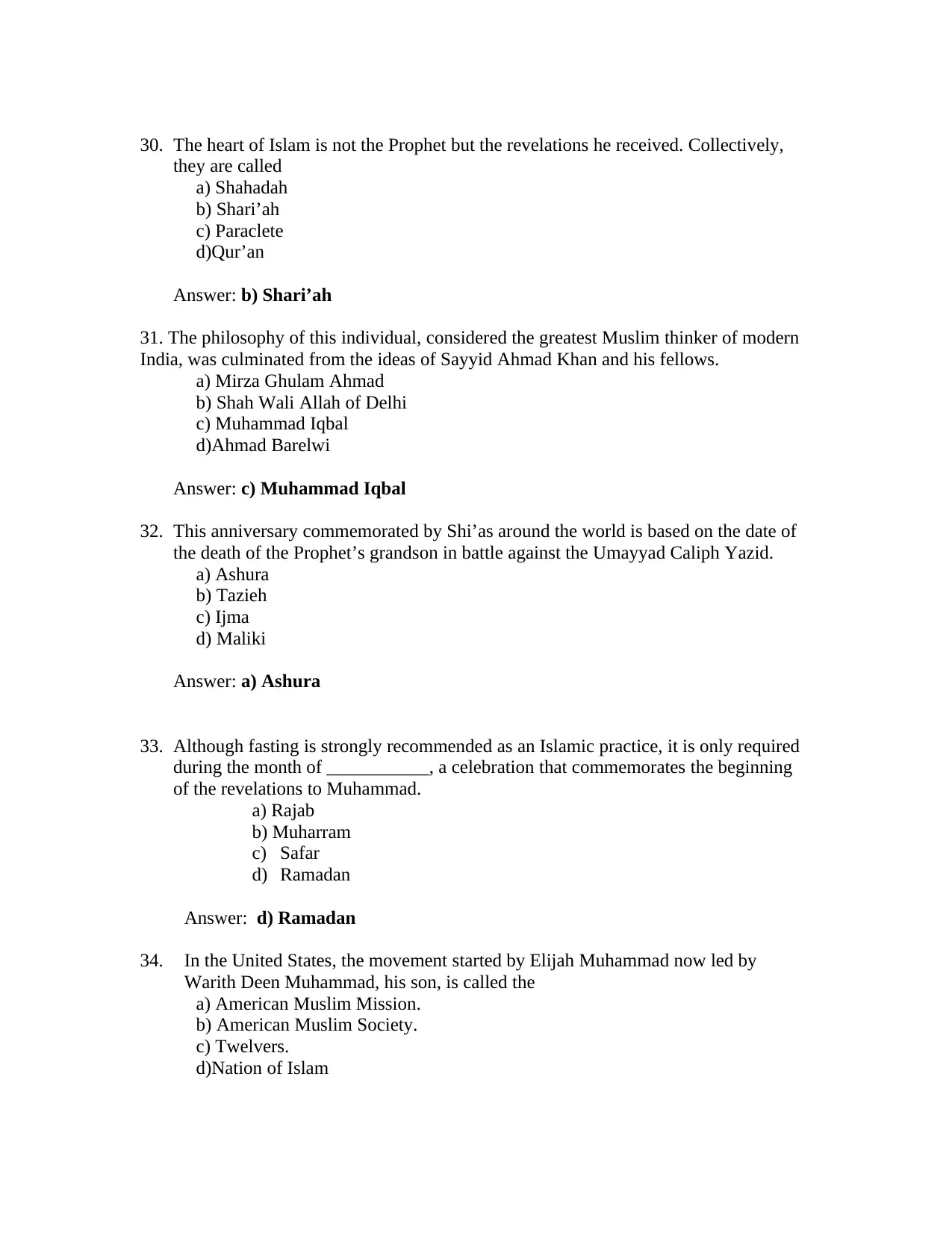
30. The heart of Islam is not the Prophet but the revelations he received. Collectively,
they are called
a) Shahadah
b) Shari’ah
c) Paraclete
d)Qur’an
Answer: b) Shari’ah
31. The philosophy of this individual, considered the greatest Muslim thinker of modern
India, was culminated from the ideas of Sayyid Ahmad Khan and his fellows.
a) Mirza Ghulam Ahmad
b) Shah Wali Allah of Delhi
c) Muhammad Iqbal
d)Ahmad Barelwi
Answer: c) Muhammad Iqbal
32. This anniversary commemorated by Shi’as around the world is based on the date of
the death of the Prophet’s grandson in battle against the Umayyad Caliph Yazid.
a) Ashura
b) Tazieh
c) Ijma
d) Maliki
Answer: a) Ashura
33. Although fasting is strongly recommended as an Islamic practice, it is only required
during the month of ___________, a celebration that commemorates the beginning
of the revelations to Muhammad.
a) Rajab
b) Muharram
c) Safar
d) Ramadan
Answer: d) Ramadan
34. In the United States, the movement started by Elijah Muhammad now led by
Warith Deen Muhammad, his son, is called the
a) American Muslim Mission.
b) American Muslim Society.
c) Twelvers.
d)Nation of Islam
they are called
a) Shahadah
b) Shari’ah
c) Paraclete
d)Qur’an
Answer: b) Shari’ah
31. The philosophy of this individual, considered the greatest Muslim thinker of modern
India, was culminated from the ideas of Sayyid Ahmad Khan and his fellows.
a) Mirza Ghulam Ahmad
b) Shah Wali Allah of Delhi
c) Muhammad Iqbal
d)Ahmad Barelwi
Answer: c) Muhammad Iqbal
32. This anniversary commemorated by Shi’as around the world is based on the date of
the death of the Prophet’s grandson in battle against the Umayyad Caliph Yazid.
a) Ashura
b) Tazieh
c) Ijma
d) Maliki
Answer: a) Ashura
33. Although fasting is strongly recommended as an Islamic practice, it is only required
during the month of ___________, a celebration that commemorates the beginning
of the revelations to Muhammad.
a) Rajab
b) Muharram
c) Safar
d) Ramadan
Answer: d) Ramadan
34. In the United States, the movement started by Elijah Muhammad now led by
Warith Deen Muhammad, his son, is called the
a) American Muslim Mission.
b) American Muslim Society.
c) Twelvers.
d)Nation of Islam
Paraphrase This Document
Need a fresh take? Get an instant paraphrase of this document with our AI Paraphraser
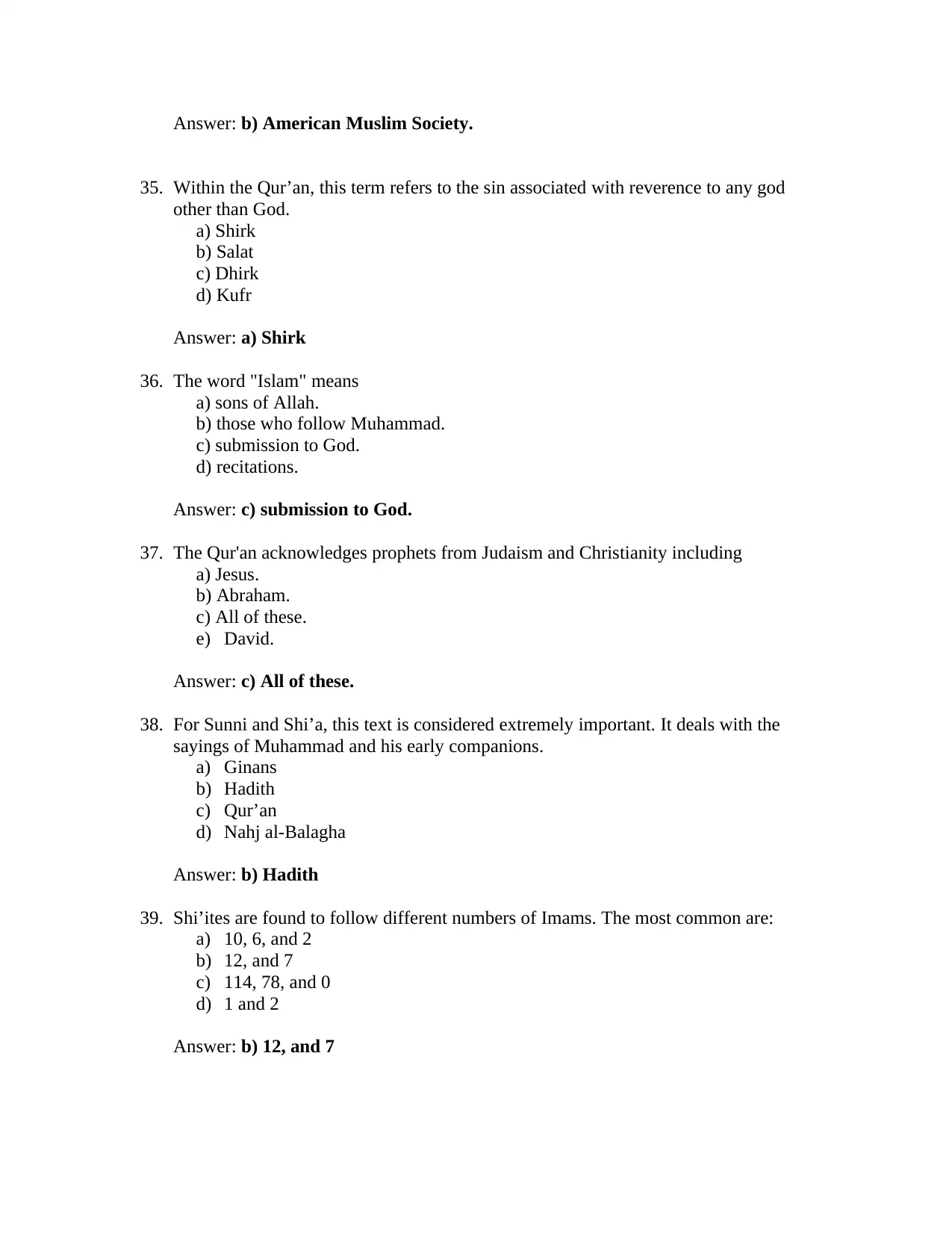
Answer: b) American Muslim Society.
35. Within the Qur’an, this term refers to the sin associated with reverence to any god
other than God.
a) Shirk
b) Salat
c) Dhirk
d) Kufr
Answer: a) Shirk
36. The word "Islam" means
a) sons of Allah.
b) those who follow Muhammad.
c) submission to God.
d) recitations.
Answer: c) submission to God.
37. The Qur'an acknowledges prophets from Judaism and Christianity including
a) Jesus.
b) Abraham.
c) All of these.
e) David.
Answer: c) All of these.
38. For Sunni and Shi’a, this text is considered extremely important. It deals with the
sayings of Muhammad and his early companions.
a) Ginans
b) Hadith
c) Qur’an
d) Nahj al-Balagha
Answer: b) Hadith
39. Shi’ites are found to follow different numbers of Imams. The most common are:
a) 10, 6, and 2
b) 12, and 7
c) 114, 78, and 0
d) 1 and 2
Answer: b) 12, and 7
35. Within the Qur’an, this term refers to the sin associated with reverence to any god
other than God.
a) Shirk
b) Salat
c) Dhirk
d) Kufr
Answer: a) Shirk
36. The word "Islam" means
a) sons of Allah.
b) those who follow Muhammad.
c) submission to God.
d) recitations.
Answer: c) submission to God.
37. The Qur'an acknowledges prophets from Judaism and Christianity including
a) Jesus.
b) Abraham.
c) All of these.
e) David.
Answer: c) All of these.
38. For Sunni and Shi’a, this text is considered extremely important. It deals with the
sayings of Muhammad and his early companions.
a) Ginans
b) Hadith
c) Qur’an
d) Nahj al-Balagha
Answer: b) Hadith
39. Shi’ites are found to follow different numbers of Imams. The most common are:
a) 10, 6, and 2
b) 12, and 7
c) 114, 78, and 0
d) 1 and 2
Answer: b) 12, and 7
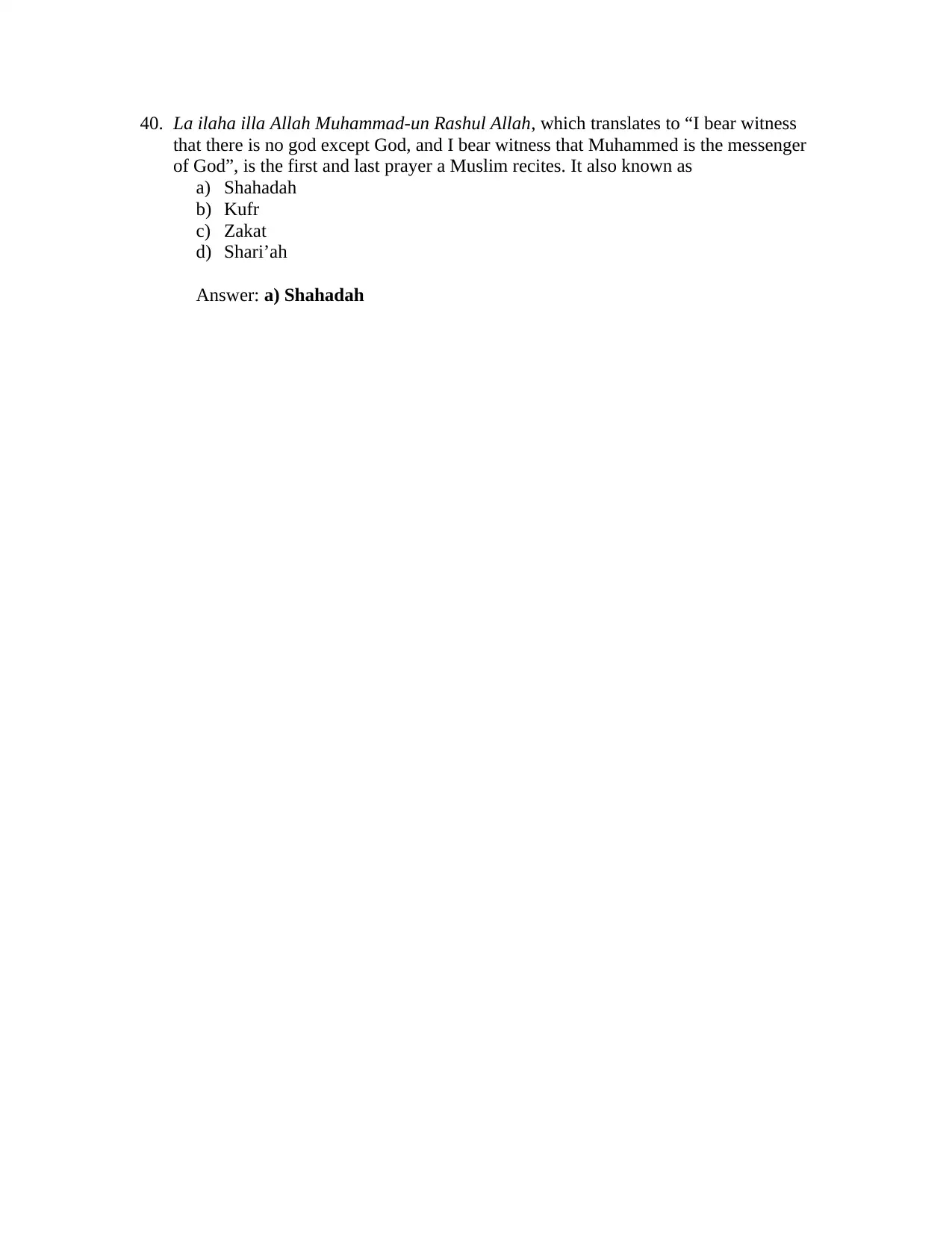
40. La ilaha illa Allah Muhammad-un Rashul Allah, which translates to “I bear witness
that there is no god except God, and I bear witness that Muhammed is the messenger
of God”, is the first and last prayer a Muslim recites. It also known as
a) Shahadah
b) Kufr
c) Zakat
d) Shari’ah
Answer: a) Shahadah
that there is no god except God, and I bear witness that Muhammed is the messenger
of God”, is the first and last prayer a Muslim recites. It also known as
a) Shahadah
b) Kufr
c) Zakat
d) Shari’ah
Answer: a) Shahadah
⊘ This is a preview!⊘
Do you want full access?
Subscribe today to unlock all pages.

Trusted by 1+ million students worldwide
1 out of 9
Your All-in-One AI-Powered Toolkit for Academic Success.
+13062052269
info@desklib.com
Available 24*7 on WhatsApp / Email
![[object Object]](/_next/static/media/star-bottom.7253800d.svg)
Unlock your academic potential
Copyright © 2020–2026 A2Z Services. All Rights Reserved. Developed and managed by ZUCOL.